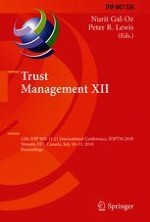2018 | OriginalPaper | Chapter
From Knowledge to Trust: A Logical Framework for Pre-trust Computations
Authors : Mirko Tagliaferri, Alessandro Aldini
Published in: Trust Management XII
Publisher: Springer International Publishing
Activate our intelligent search to find suitable subject content or patents.
Select sections of text to find matching patents with Artificial Intelligence. powered by
Select sections of text to find additional relevant content using AI-assisted search. powered by
